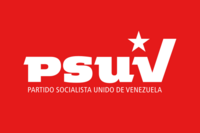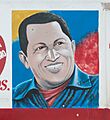United Socialist Party of Venezuela facts for kids
Quick facts for kids
United Socialist Party of Venezuela
Partido Socialista Unido de Venezuela
|
|
|---|---|
 |
|
| President | Nicolás Maduro |
| Vice President | Diosdado Cabello |
| Founder | Hugo Chávez |
| Founded | 24 March 2007 |
| Merger of |
|
| Headquarters | Maripérez, Caracas |
| Newspaper | Cuatro F |
| Youth wing | JPSUV |
| Paramilitary groups | Colectivos, Units of Battle Hugo Chávez |
| Membership (2024) | 4,240,032 |
| Ideology |
|
| Political position | Left-wing to far-left |
| National affiliation | Great Patriotic Pole |
| Regional affiliation | COPPPAL São Paulo Forum |
| International affiliation | Axis of Resistance World Anti-Imperialist Platform For the Freedom of Nations! |
| Colors | Red |
| Anthem | "La Hora del Pueblo" ('People's Hour') |
| Seats in the National Assembly |
219 / 277
|
| Seats in the Latin American Parliament |
4 / 12
|
| Governors |
19 / 23
|
| Mayors |
303 / 335
|
| Party flag | |
 |
|
| Full party logo | |
 |
|
The United Socialist Party of Venezuela (known as PSUV) is a major political party in Venezuela. It has been the main ruling party of Venezuela since 2007. The party was created by combining different political groups that supported the "Bolivarian Revolution." This revolution was led by former President Hugo Chávez.
In the 2015 parliamentary election, PSUV lost its majority in the National Assembly. This was the first time this happened since the Assembly was created in 2000. However, in the 2020 elections, PSUV won back a large majority of seats.
Contents
History of the PSUV
The idea to create the PSUV came from Venezuelan President Hugo Chávez. He wanted to unite many of the groups that supported his "Bolivarian Revolution" after he won the 2006 presidential election. His own party, the Fifth Republic Movement, led this effort.
Many smaller parties joined PSUV, including the People's Electoral Movement and the Socialist League. However, some other parties, like the Communist Party of Venezuela and Fatherland for All, chose not to join. They still supported Chávez but wanted to remain separate.
The PSUV held its first big meeting in early 2008. Hugo Chávez was named the President of the new party on March 14, 2008.
After Hugo Chávez passed away, the party faced some challenges. People described it as "fracturing" or "weakening" because of the loss of Chávez and problems with Venezuela's economy.
What the PSUV Believes In
The PSUV is a socialist party. This means they believe that a socialist society is the best way to improve things, rather than a capitalist system. They get their ideas from important Venezuelan thinkers like Simón Bolívar and Simón Rodríguez.
The party also believes in scientific socialism, Christianity, and ideas about fairness for everyone. They want to build a political system that respects nature and helps people survive.
The PSUV supports the Bolivarian Revolution. They see it as a peaceful way to move towards socialism and away from capitalism. The party also believes in fighting against "imperialism." This means they want to form a group of socialist countries in Latin America.
Hugo Chávez once said that the PSUV was a "very young party." Many of its members were young, and their families had often benefited from Chávez's social programs.
In 2010, the PSUV held a special meeting. They agreed on several main ideas, including socialism, Marxism, and Bolivarianism. They also emphasized humanism, working with other countries, and loving their own country. They believe in participatory democracy, where people have a say, and in using democracy within the party itself. The party sees itself as a leader in the revolutionary process.
The party held its 3rd Congress in 2014. At this meeting, Nicolás Maduro was elected as the party's second president. Hugo Chávez was honored as the party's "eternal president and founder." The party's rules and policies were also updated. The 4th Party Congress took place in 2018.
Party Symbols
The PSUV uses symbols that honor Hugo Chávez. You might see images like the "Chávez eyes" along with the party's own symbols.
-
A street painting of Hugo Chávez in Punta de Piedras
-
A billboard with Hugo Chávez's eyes and signature in Guarenas
How the Party is Organized

Party Congress
The highest group in the PSUV is the National Party Congress. This is the party's most important body. It meets when the National Board decides it's needed. Delegates from all over the country attend.
The Congress has the power to:
- Choose the President and Vice President of the Party.
- Elect members for the National Board and other important groups.
- Change the Party's rules.
- Discuss and create new party policies.
The National Party Congress is held every four years.
National Board
The party is led by its "Eternal President," Hugo Chávez (this is a title given after his death). The current president is Nicolás Maduro, and the vice-president is Diosdado Cabello. They work with the National Board of Directors.
The PSUV National Board is the top leadership group for the party. It can make new policies between the big Party Congress meetings.
Units of Battle Hugo Chávez (UBCh)
The Units of Battle Hugo Chávez (UBCh) are groups of PSUV members. They have both military and political roles. The UBCh started as groups to protect the Bolivarian Revolution and help the party during elections. They got their current name in 2013.
These units are the basic party groups in Venezuelan communities. Four or more UBCh groups form a "People's Struggle Circle" in a community. Each UBCh is divided into smaller "Unit Patrols" that help party members in different areas.
Other groups that help the party include:
- The PSUV National Political Bureau
- PSUV Regional Departments, led by Regional Vice Presidents
- PSUV Sectors Organizations, led by Sectoral Vice Presidents
- The United Socialist Party of Venezuela Youth
Election Results
Presidential Elections
The PSUV has supported its candidates in presidential elections.
| Election year | Candidate | First Round | |
|---|---|---|---|
| Number of votes | Percentage of vote | ||
| 2012 | Hugo Chávez | 8,191,132 | 55.1% (Won) |
| Main party in the "Great Patriotic Pole" alliance. | |||
| 2013 | Nicolás Maduro | 7,587,579 | 50.6% (Won) |
| Main party in the "Great Patriotic Pole" alliance. | |||
| 2018 | Nicolás Maduro | 6,205,875 | 67.8% (Won) |
| Main party in the "Great Patriotic Pole" alliance. | |||
| 2024 | Nicolás Maduro | 6,408,844 | 51.95% (Won) |
| Main party in the "Great Patriotic Pole" alliance. | |||
Parliamentary Elections
The PSUV also participates in elections for the National Assembly.
| Election year | Number of votes | Percentage of vote | Number of seats won | Change in seats | Party Leader |
|---|---|---|---|---|---|
| 2010 | 5,451,419 | 48.3% |
96 / 165
|
Diosdado Cabello | |
| 2015 | 5,599,025 | 40.9% |
52 / 167
|
||
| 2020 | 4,317,819 | 69.3% |
219 / 277
|
Jorge Rodríguez |
Images for kids
See also
 In Spanish: Partido Socialista Unido de Venezuela para niños
In Spanish: Partido Socialista Unido de Venezuela para niños
 | Ernest Everett Just |
 | Mary Jackson |
 | Emmett Chappelle |
 | Marie Maynard Daly |







